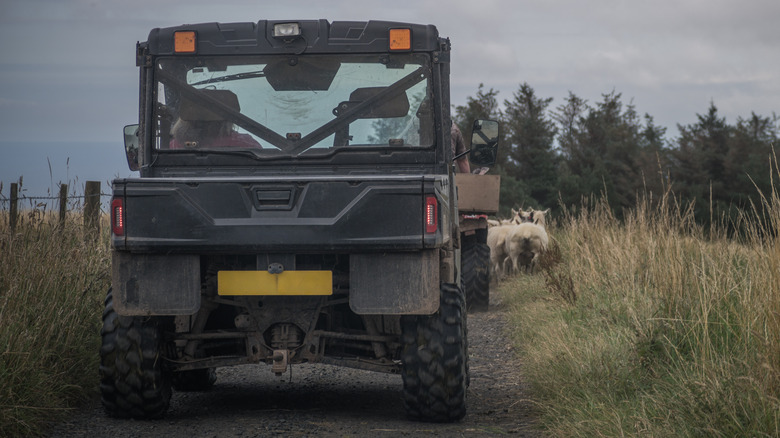Polaris loves to brag that its three-wheeled Slingshot is street-legal, so naturally the side-by-side crowd wants in on the commuter fun. And why not let these off-road land boats enjoy some smooth tarmac sailing? The reason: A Slingshot is federally classified as an autocycle, even if it‘s amazingly unpleasant to wheel around. Conversely, most utility task vehicles (UTVs) are labeled as an off-highway vehicle (OHV). That single bureaucratic checkbox makes all the difference.
Across the United States, lawmakers have carved the rules into three tiers. We will break these down as green, yellow, and red-light states. Twenty green-light states offer a statewide registration path, a pair of yellow-light states dump the decision on local governments, and a longer list of red-light states flat-out prohibit on-road use. If you live in one of the green states, plating your RZR or Maverick can be as simple as adding mirrors, a horn, and liability insurance. Everywhere else, you’re looking at county-by-county ordinances, farm-use loopholes, or a hard no.
Before we go any further, here are the green-, yellow-, and red-light states as of July 2025:
- Green-light: Alaska, Arizona, Idaho, Iowa, Kansas, Michigan, Missouri, Montana, New Hampshire, New Mexico, North Carolina, North Dakota, Ohio, Oklahoma, South Dakota, Tennessee, Utah, Washington, West Virginia, Wisconsin, Wyoming
- Yellow-light: Alabama, Colorado, Indiana, Texas
- Red-light: Arkansas, California, Connecticut, Delaware, Florida, Georgia, Hawaii, Illinois, Kentucky, Louisiana, Maine, Maryland, Massachusetts, Minnesota, Mississippi, Nebraska, Nevada, New Jersey, New York, Oregon, Pennsylvania, Rhode Island, South Carolina, Vermont, Virginia — plus the District of Columbia.
The green-light club: States with statewide UTV programs
Here’s where the law actually gives UTV owners the green flag. Twenty-one states now publish a clear, statewide process to turn a UTV into a plated runabout, though each has its own fine print. Arizona is the poster child: title the machine, bolt on headlights, a mirror, a horn, buy the annual OHV decal, and the DMV hands you a motorcycle-style plate. Helmets are mandatory only for riders under 18, but insurance is mandatory for everyone. South Dakota is even friendlier — add a rear-view mirror, brake lights, a horn, and eye protection if you run without a windshield, and you’re legal on every public road except the interstate.
Michigan takes a different approach: you can cruise local roads at 30 mph or under, or go all-in with the “Assembled Vehicle” program, which requires a windshield, wipers, DOT-approved tires, turn signals, and a full safety inspection. After that, the state treats your side-by-side like any compact car.
No matter which green-light state you call home, you’ll bolt on a motorcycle-size plate and an OHV decal, but you still can’t touch the Interstate.
Yellow lights, red lights, and reality checks
Live in Colorado or Indiana? Legality changes the moment you cross county lines, so the only safe strategy is to check before firing up the 900-cc triple on that Maverick X3 and crossing. Colorado tourist towns such as Cañon City allow permitted UTVs on streets but only during certain hours, while major metro areas while Denver flat-out bars ATVs and UTVs on public streets.
Utah proves that even green states can feel yellow in practice. Moab’s residents fought noise and dust by imposing a 15-mph OHV speed limit and a 92-A-weighted-decibel noise cap, with violations drawing citations that start around $130 and $180 respectively, under Utah’s fine schedule.
In red-light jurisdictions — California, New York, Florida, and two dozen others — state law blocks road-legality entirely. Most of these states only allow what is approved under agricultural vehicle usage, such as hauling hay or equipment. That is about as “street-legal” as it gets there.
For everyone else, remember: plating a UTV never makes it a car. Speed limits, helmet rules, and no-interstate rules still apply. Before you start dreaming about shoulder-running traffic in a Can-Am, read your state and local statutes, call your county, and make sure your insurance agent is on board — because the ticket book for dumb things definitely will be.


